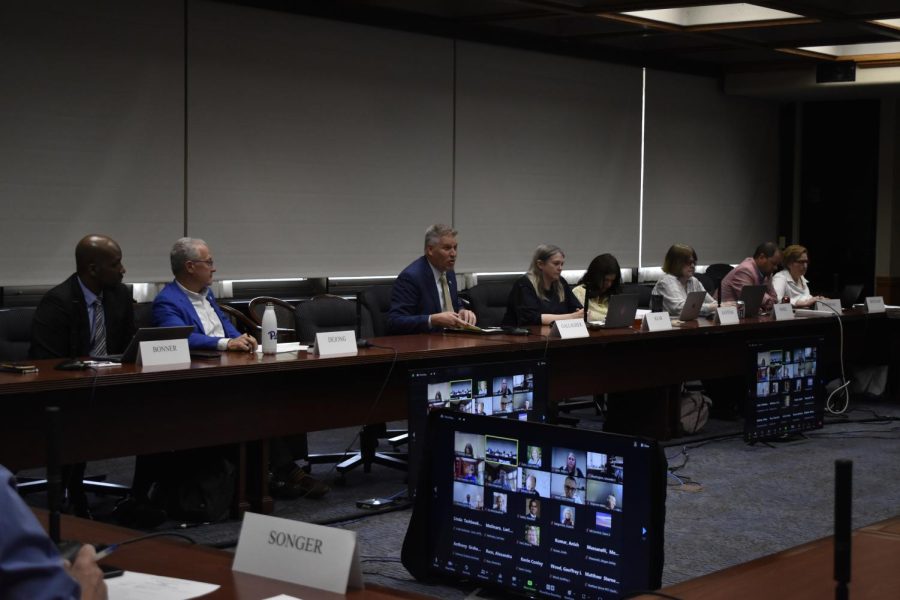Senate Council discusses recent public safety concerns
Romita Das | Senior Staff Photographer
The Senate Council meeting on Thursday in Posvar Hall.
April 21, 2023
Chancellor Patrick Gallagher won’t sugarcoat anything when it comes to the hoax shooter threats that have impacted Pitt in the past month.
“These are not prank calls, these are terrorist attacks,” Gallagher said. “They’re using disinformation to create fear and trauma and specifically to cause an immediate police response.”
Gallagher spoke on these attacks at the University Senate Council’s monthly meeting in 2700 Posvar Hall and on Zoom Thursday afternoon. The council mainly discussed recent public safety and emergency management concerns, including the hoax shooter threats and a protest Tuesday evening.
Gallagher said these events are opportunities to reflect on Pitt’s emergency preparedness, and the community has “correctly” held the University accountable for improving its response. While he said Pitt is looking at many aspects of its emergency management — such as exit paths, locking doors, police procedures, training and staffing — the most immediate improvement was in how the University shares information in an emergency.
“That was the origin of a lot of the criticism, particularly after the second event at the Hillman Library,” Gallagher said. “I hope many of you saw that with the civil unrest issue that we had this week, the information flow was dramatically different, and that is a credit to the team that’s been working hard to basically reposition.”
Pitt police issued an Emergency Notification Service alert Tuesday evening warning the community of a “public safety emergency.” The alert referred to a protest at the O’Hara Student Center as Michael Knowles and Brad Polumbo debated government regulation of transgender identity inside the building.
At the protest, more than one smoke bomb was set off, and one “incendiary device” was thrown at police officers. Additionally, protesters burned an effigy of Knowles in the street. Gallagher said the violence displayed at the protest was “an absolutely unacceptable outcome.”
“Freedom of speech does not mean you get to throw explosive devices at anyone, including responding police officers,” Gallagher said. “It does not mean you get to disrupt and light fires and close roads and deter patients from hospitals and all the other nonsense that we saw on Tuesday night.”
Anna Yatsko, a College of General Studies Student Government Board board member, said she felt the concerns of protesters were delegitimized by a focus on condemning violence — violence which she said did not represent the majority of the Pitt community.
“For everyone who was horrified, scared or threatened by the violence this week, I am so sorry and my heart is with you, but I cannot stand here and watch the hurt and pain of students being dismissed simply because violence erupted that the majority of students were not a part of,” Yatsko said. “Their hurt and suffering and feelings of betrayal by the University are valid.”
In response to Yatsko’s comments, Senate Council President Robin Kear reiterated her disapproval of Knowles’ statements about transgender people and said she disagreed that the Council dismissed or delegitimized protesters by condemning the violence.
“Last month, I spoke both at [Faculty] Assembly and [Senate] Council about my disgust at the comments and how our community felt and I didn’t feel like I needed to necessarily repeat that again, so I apologize if that wasn’t clear,” Kear said. “I don’t feel that anyone here has tried to delegitimize the concerns based on, you know, a couple of bad actors.”
Gallagher added that the investigation into Tuesday’s protest is ongoing.
“I have made no attribution about who was responsible. We intend to find out who was responsible and take any and appropriate action,” Gallagher said. “It’s a disservice to those who are electing to peacefully exercise their voice through protest, which is a protected right that we all enjoy, to have that taken over by those that were seeking to turn it into something violent and confrontational.”
In his report, Gallagher also spoke about Pitt’s recent announcement that graduates at the University-wide commencement ceremony will receive four tickets each for family and friends. He said Pitt implemented the ticketing system to be “fair to all families.”
“We are at actual risk of outstripping the capacity of the Petersen Events Center — which is actually amazing to me, because when I first got here, we actually closed the seats behind the stage and and we combined undergraduate and graduate commencement in one event, and it still wasn’t full,” Gallagher said.
He added that the University is setting up overflow sites and working to improve those overflow sites to ensure they provide a good experience for those who cannot attend the ceremony.
Kear gave an update on faculty union relations in the Senate. She said a Senate-union communication group met in late March and is currently setting up its next meeting. Kear also said she was glad to see the union post a list of articles and dates proposed by the union and administration publicly.
Senate Council passed a policy on travel cash advances. Budget Policies Chair Juan Taboas said the updated policy will bring cash advances in line with the OneCard system. Cash advances for travel purposes will now be administered through the OneCard at an ATM rather than as a direct deposit through PittPay.
Senate Council also passed a policy on the University network. Brian Hart, senior project manager for Pitt Information Technology, said this is an update to an existing policy which “contains a horrendous amount of technical detail.” The updated policy will remove some technical jargon, but not change its parameters, Hart said.








